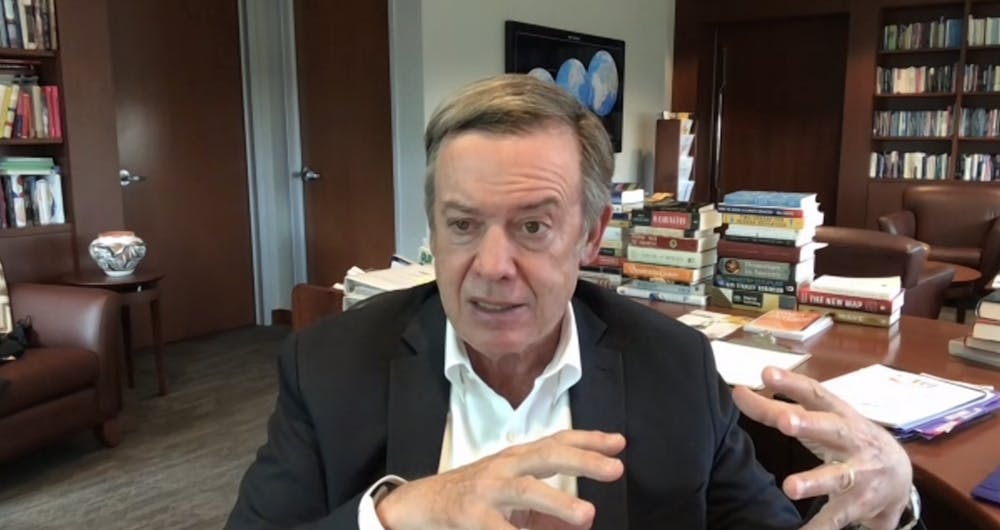ASU President Michael Crow said in a meeting with The State Press Wednesday the University remains flexible heading into the Fall 2021 semester but will prepare for a return to a "new normal."
More University community members are expected, but not yet required, to be vaccinated against COVID-19, enabling faculty to teach students in the classroom without the need for accommodations, Crow said.
He said the University expects to conduct in-person classes with faculty present for the fall semester unless a "Godzilla variant" of the virus becomes present leading to case surges that require plan changes.
Crow used the term "Godzilla variant" throughout Wednesday's meeting to allude to a dangerous, contagious variant that does not exist but could make the pandemic worse if it did.
ASU's COVID-19 guidelines will continue to be based on guidance from the Centers for Disease Control and Prevention, and choices will still be made with some hesitation. Daily health checks will still be part of the regular routine as will random testing in some capacity.
On Monday, the University plans to update its mask and facial covering guidelines for outdoor spaces, Crow said, without providing much detail.
No vaccine requirement yet
Crow said the University will not yet require students and faculty to get a COVID-19 vaccine given the number of people who have already received it.
So far, the University has helped vaccinate nearly 1.4 million people at sites it runs in partnership with the Arizona Department of Health Services. Around 75% of faculty have been vaccinated, Crow said, and the University continues to provide students and staff free appointments on campus. The number of students who have been vaccinated is not as exact, but Crow estimated the number is already in the thousands.
"A few days ago we had 18,000 or 19,000 vaccines set aside for students," Crow said. "I don't know how many of those have been taken, but we're offering them."
If the increase of vaccinations changes, not enough students are vaccinated or a more contagious virus variant emerges, then plans could change, Crow said.
"Right now, we're on a good track (administering the vaccine) and this is the track we're staying on for the moment," Crow said. "And if Godzilla shows up, we'll have to do something."
Fall specifics too soon to tell
While random testing, mask wearing and social distancing will likely still be practiced on ASU's campuses during the fall semester, many specifics for what the in-person return will look like have yet to be determined.
"We don't know exactly what 'new normal' will be like, but we do want everyone to reassemble," Crow said.
Crow said if more people get vaccinated to reach "herd level immunity numbers," he hopes the return to normal would include less masking at public events and possibly even large-scale public events where vaccination will be required for attendance.
Crow hopes "very few" faculty accommodations will need to be requested and approved because so many faculty have already been vaccinated.
ASU Sync might be staying past pandemic
The University will continue to utilize Zoom for classes when "that's productive to the success of our students," Crow said, but exact details are still being worked out.
ASU spent over $1.6 million from 2019 to 2020 on Zoom's goods and services, according to contracts obtained by The State Press through a public records request.
University administrators see Zoom as a way to improve access to education in Arizona, allowing existing programs to reach students no matter their location. Eventually, the University wants to begin offering Zoom-only degrees.
"Zoom did allow us to expand access to education, even during the pandemic, and certainly after the pandemic as well," said Anne Jones, associate professor in the School of Molecular Sciences and soon-to-be vice president for undergraduate education.
Faculty accommodations
Less faculty will be granted accommodations to teach remotely in the Fall 2021 semester due to the COVID-19 vaccine, Crow said.
Before the Fall 2020 semester, over 1,400 faculty had been given an accommodation to teach remotely. Crow said Wednesday about 75% of faculty have already been vaccinated.
"There'll be very few accommodations because faculty will be vaccinated, and vaccination means that, with a very, very high probability, ... you won't get very sick from this disease and you won't die from this disease," Crow said.
Faculty who have health conditions may still receive an accommodation.
CAARE Center
Despite demands for an on-campus rape crisis center from student advocacy groups, there are no plans to establish a Campus Assault Advocacy, Resources & Education Center.
Instead, Crow and Joanne Vogel, vice president of student services, said ASU is focusing on expanding resources and services which already partially exist within ASU Health Services or will be part of the proposed Family Advocacy Center in Tempe.
READ MORE: ASU explores Family Advocacy Center as students push for CAARE Center
"We have committed to having a victim advocate join us in health services that will be available because there was concern about going into the police department for some victims to seek victim advocacy," Vogel said.
Crow has previously said a building with the words "rape center" on its side would not be the best place to provide help and assistance to sexual assault survivors.
"That then becomes the place that then people will say 'Well the people going into that building have been sexually assaulted,'" Crow said. "We believe that is not a way to deal with the privacy necessary associated with some of these events."
Crow's LIFT initiative and multicultural centers
Last September, Crow announced 25 action items to support ASU's Black students and staff, which was later named the Listen, Invest, Facilitate, Teach Initiative, aimed at improving equality and justice within the ASU community.
An advisory council was created in October, with committees composed of students, faculty and staff formed to tackle each action item and bring "tangible recommendations" to Crow.
Some of the goals include hiring more faculty of color, establishing multicultural spaces on all four campuses, hosting recruitment fairs and training all faculty on search committees to identify systemic bias in hiring.
The multicultural centers Crow proposed to be built on ASU's four campuses are still in planning stages. According to a page detailing the LIFT Initiative, a group called the Multicultural Space Workgroup will "define the vision for the space to advance recommendations for design options" by the end of Spring 2021, but Crow has yet to receive anything concrete.
"You can't finish that overnight, it takes a while," Crow said, adding that updates on the construction of the multicultural center will be announced at a later date
University still financially stable
Crow said the University has remained financially stable despite increased expenses to manage COVID-19. The University will see a "net positive financial outcome" for the fiscal year, meaning ASU overall has taken in more than it had paid out from July 2020 to June 2021, largely due to federal stimulus funds.
With funds from the government and increased enrollment, the University still does not plan to lay off employees, cut salaries, eliminate programs or reduce services, Crow said.
Reach the reporters at wmyskow@asu.edu, pjhanse1@asu.edu and anatar12@asu.edu and follow @wmyskow, @piperjhansen and @AnushaNat1 on Twitter.
Like The State Press on Facebook and follow @statepress on Twitter.
Continue supporting student journalism and donate to The State Press today.

Wyatt Myskow is the project manager at The State Press, where he oversees enterprise stories for the publication. He also works at The Arizona Republic, where he covers the cities of Peoria and Surprise.


Piper Hansen is the digital editor-in-chief at The State Press, overseeing all digital content. Joining SP in Spring 2020, she has covered student government, housing and COVID-19. She has previously written about state politics for The Arizona Republic and the Arizona Capitol Times and covers social justice for Cronkite News.




